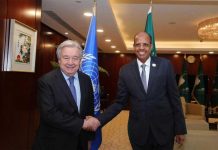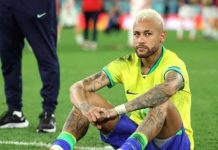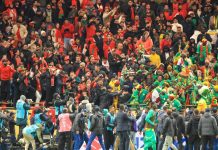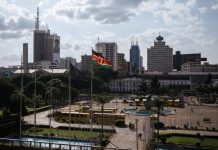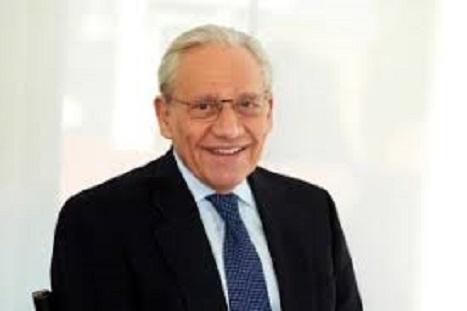
Africa-Press – Mauritius. Double victory for the MSM and in particular for Sir Anerood and Pravind Jugnauth, one in the Chagos case before the International Court of Justice, and the other before the Privy Council in relation to the MedPoint case.
For Pravind Jugnauth, this victory allows him to enter through the front door – in the last year of the mandate of the current government. “Better late than never…” What do you think?
Lindsay Rivière: By an extraordinary coincidence, we saw on the same day two great successes which will mark the careers of Pravind and Sir Anerood Jugnauth: the judgment of the Privy Council favorable to the Prime Minister and a spectacular moral and legal victory for Maurice – of the kind David and Goliath — on Britain before the International Court of Justice.
It was a turning point and the Jugnauths have every right to rejoice today. As Head of Government, Pravind Jugnauth will no longer have to personally drag behind him the noisy saucepan of Medpoint, as well as the embarrassment of a 12-month prison sentence.
He thus finds peace of mind, the public respectability that a personality of this rank must have and all the fullness of his function. It is, for him, a huge relief, and ‘in all fairness’, everyone must recognize that he fought a lot for this result.
It should also be noted that, for 8 years, Pravind Jugnauth has behaved in this affair with great dignity, elegance and courage. He has, in fact, resigned from his ministerial functions, once condemned.
He refused community work, which turned out to be a good decision, given the sequence of events. He defended his honor tenaciously. All of this will add to his character.
We must therefore congratulate him and not question the judgment. At the same time, his combativeness was due to the fact that he played big and that is why we can speak not only of victory but also of ‘relief’.
If he had not won, the Prime Minister would have slept in prison. Finally, in the case of the MSM, let us observe that it is not on a specific legal victory that one builds an electoral campaign.
In three months, knowing Mauritius, we will no longer talk about it and the voter will have returned to the concerns of his daily life. * Is the victory, in the claim of the Chagos, of a completely different nature?
Absoutely ! The judgment on the Chagos has an absolutely historical dimension. Even if it does not have the force of law and cannot be imposed on the English and the Americans, this judgment is likely to change many things and many perspectives for the Republic of Mauritius for years to come.
If the Chagos are considered tomorrow in law as being Mauritian, this would change the extent of the Republic, would widen our maritime economic zone, would impact on the right of return of the Chagossians, or could bring a lot economically to Mauritius (if we can one day convince Americans to rent Diego Garcia from Mauritius, like Guam in the Philippines, etc).
The outcome of the Chagos is a magnificent achievement of all our great political leaders (SAJ certainly but also Paul Bérenger, Navin Ramgoolam and others from all political backgrounds). That said, it is Sir Anerood who deserves the biggest tip of the hat.
We will long remember the image of this old patriot, QC dressed as a lawyer in The Hague, defending Mauritius’ claim to the Chagos, 53 years after the Lancaster Constitutional Conference, bringing the International Court of Justice to denounce the ‘unlawful detachment’ of the Chagos by an ‘unlawful act from England.
This must be done! Sir Anerood sometimes irritates Mauritians but we must recognize that he is truly an exceptional being that Mauritian history will not forget!
* In the immediate future, what impact will this double victory have on the balance of power on the political spectrum, in your opinion?
It will certainly perk up the MSM, by demonstrating that the Jugnauth party is just as capable of solving major national problems. This double victory (MedPoint and Chagos) comes to establish the tenacity and the capacity of resistance of the MSM vis-a-vis the PTr.
Navin Ramgoolam would be wrong to ‘write off’ the MSM, to treat Pravind Jugnauth as a political dwarf or to already think that he will make short work of Jugnauth in 2020.
The MSM, according to all we see, does not don’t just ‘roll over and die’, as they say. Have you noticed how not only the MSM supporters but also the PMSD and MMM supporters have welcomed the judgment of the Privy Council?
To the Opposition parties, this double victory will establish that, from now on, the MSM can be frequented again and perhaps even become a winning ally tomorrow.
* The MSM had found good reasons to spare itself an electoral test at No 18 in December 2017 in a particular political context.
Do you think things have evolved positively since then, and that they will become more accentuated post-MedPoint/Chagos so that the MSM can look to the future with more confidence?
Definitely the MSM have gained confidence since 2016, since Sir Anerood ‘stepped down’. The orange party was starting to panic and nothing seemed to work.
Pravind Jugnauth brought to the party more energy, more imagination and more will to win. The Anerood/Pravind transition worked well from this point of view.
We also note that the MSM leader no longer wants to remain in the shadow of his father. He wants to emerge on his own and develop his own program and his own team.
Two years ago, no other party would have wanted to approach the MSM politically. Today, with Pravind, a few suitors are already emerging (PMSD, MP and even MMM under certain conditions).
The Prime Minister still retains the initiative, especially since Navin Ramgoolam oddly does not seem to capitalize as much as he could have on the by-election of Arvind Boolell in Quatre Bornes.
The Labor Party these days is surprisingly wise. This does not look like the PTr seeking to regain power in 2005! * The question that arises, however, is whether the MSM-ML government alliance will be able to sustain and maintain the momentum of this double victory until the next legislative elections.
What do you think ? Hardly. I think the ML of Ivan Collendavelloo does not bring much to the MSM. IMHO, if he’s not careful, ML might not even be part of the equation in 2020.
It will either have been absorbed into the MSM or will have lost all influence if the MMM gives the slightest sign of interest in entering into alliance negotiations. The ML had only a temporary interest. He does not have the breath to hold on the political scene in the long term.
Take my word for it: If Paul Bérenger comes to the negotiating table with the MSM, his very first request (before anyone speaks at the MSM) will be that he no longer wants to see around the MSM nor Ivan Collendavelloo and his ML, nor Alan Ganoo and the MP, nor Steve Obeegadoo/ Pradeep Jeeha and their MMM dissidents and, of course, nor Xavier-Luc Duval and the PMSD!
In Bérenger’s eyes, since 1970, there have never been any ‘MMM dissidents. There have only been ‘traitors’. A quarter of a century after their estrangement, he barely shakes hands with Jean-Claude de l’estrac, who has done so much for him! That says it all.
With the leader of the MMM, it’s always all or nothing! After the double victory of the Jugnauths, now comes the time for negotiations! It’s all going to happen now.
* You do not see the MSM being able to face the electorate alone in the next legislative elections on the basis of this double victory; it still needs this “winning alliance” with more than 50% of the votes, as you said in an interview, and this alliance will have to be made with the MMM, right?
MSM alone? Surely not. Moreover, no party can face an election alone. We must stop conveying these fads. The 11 elections since independence have all been won by alliances.
Pre-election alliances are a necessary evil with the First Past the Post system and no party is strong enough or representative of all communities to win or govern alone.
What about the MSM and the upcoming elections? To hope to win, the MSM must (i) have a strong track record, and it does not yet, which is why there will be no snap elections; (ii) have a good electoral alliance.
Let’s see the options of the MSM: Pravind Jugnauth cannot decently turn to Navin Ramgoolam (even if we are talking about socio-cultural or foreign pressures for a 2010 remake).
The Prime Minister can therefore only either (i) try to build a broad coalition including PMSD, ML, MP and some MMM dissidents but not MMM; (ii) or outright discuss with the MMM for a formal alliance, to the exclusion of all other parties.
The broad coalition bringing the PMSD back to the side of the MSM and attracting the MP is not easy to conclude because the PMSD, knowing the unpopular MSM, will be very greedy and will want safe and ‘winnable’ seats as much in town where the blues are strong than in the countryside where the MSM is strong.
Like Bérenger, Xavier Duval will also not want Ivan Collendavelloo between his legs or want to be the indisputable No. 2. However, the MSM would not be the first choice of the PMSD.
Xavier Duval gets along better with Pravind than with Sir Anerood (which will make some things easier) but in the end the PMSD prefers to work with the Labor Party, its old natural ally.
The current situation is a bit ambiguous with the reds: Navin Ramgoolam is currently sulking Xavier Duval for his infidelity towards Arvin Boolell at Quatre Bornes.
Ramgoolam also speaks of going alone and could also consider doubling Xavier Duval by proposing a Muslim Deputy Prime Minister in 2020 (like Dr Beebeejaun in 2010) and thus brewing wider, then ‘agreeing’ to put the PMSD leader at No. 3 of the hierarchy. Xavier Duval doesn’t even want to hear about it. So it’s complicated for everyone. Everyone plays tight.
Pravind Jugnauth can also appeal to Alan Ganoo and the MP but Ganoo has always been (along with Jayen Cuttaree) the most pro-Labourist of the Militants and he would already have an offer of 4 ‘winnable’ tickets from Dr Navin Ramgoolam (for himself , Barber, Diolle and Roopun).
It is therefore by no means certain that the MP wants to venture into the broad Jugnauth coalition and lose everything. Finally, even if Xavier Duval, Ivan Collendavelloo and Alan Ganoo came, would they bring to the MSM the additional votes required (10 to 15%) to hope to win?
Faced with a Labour-PMSD-MP armada, the MSM could therefore find itself constrained and forced, in desperation, to seek an alliance with the MMM, which until the end will say that it wants to go it alone in order to be able to capitalize on the relative weakness of the MSM.
This is where Bérenger will be waiting for Pravind Jugnauth, with a fierce appetite and a long shopping list. The question should also be asked in the following form: Who has the most to lose in the event of a big Labor victory? The Jugnauths or Bérenger?
Paul Bérenger has been firmly rooted in the Opposition for 50 years. He doesn’t care about being in the Opposition for another 5 years. The MMM leader is, moreover, a great friend of Navin Ramgoolam and has nothing to fear, personally, from a Labor regime of which he was the electoral ally in 2014.
Finally, Bérenger since 1976 prefers to work with the PTr than with the Jugnauths, which has split his party on several occasions… But can the Jugnauths face the prospect of the PTr in power? Can they contemplate a big defeat, facing a red opponent who dreams only of revenge and who will undoubtedly be merciless, after all that the MSM has put him through?
* Paul Bérenger’s last position is that he favors a three-way fight, hoping no doubt to be able to snatch a victory thanks to the dispersion of votes between the MSM and the PTr.
But MMM’s performance at No. 18, where it only got 14% of votes, wasn’t heartwarming, was it? Paul Bérenger is obliged to favor, for the moment, a three-way fight.
No one has approached him yet. Its young activists, the third generation MMM, no longer want to hear about alliances where everyone uses MMM and then rejects it like a Keenex.
On paper, the MMM can also hope to benefit in certain urban constituencies (Curepipe, Beau-Bassin, Rose Hill, Port Louis) from the division of the others and elect enough deputies to arbitrate all ‘hung parliament’ and carve out a share of the government.
“Going there alone” is also, for the moment, more mobilizing than going into a new alliance with two unpopular parties (PTr and MSM).
One can see some logic in the MMM strategy. But this strategy is dangerous, very dangerous even for the MMM. In a fight with several, the MMM can be annihilated if it does not reach 30% in the cities (and it only made 14% in Quatre Bornes!).
There has already been no rural MP for two elections. Will Paul Bérenger take this risk of being ‘wiped out’? Or, in the end, will he be tempted by a tempting offer from the MSM?
* We may be mistaken about the intentions of Pravind Jugnauth who, it seems, would not be very keen on the idea of cohabiting with Paul Bérenger in the government.
Do you think he will seek this alliance with Paul Bérenger “at any cost”? Pravind Jugnauth would have preferred an alliance with the MMM but without Bérenger in government and installed in the Réduit.
But Bérenger is not interested in the Reduced. He is a man of action, a warrior. It is very difficult to work in government with Bérenger. He defends many principles, he is demanding, he does not accept incompetence, he hates corruption.
He is a ‘compulsive interferer’, jostling his allies, etc. He absolutely does not want to serve in the Presidency (even if at his age and taking into account his great patriotism, he would make an excellent President of the Republic).
On the other hand, Pravind Jugnauth emerges and does not want another ‘mentor’ after his father from whom he is trying to free himself. But often necessity makes law.
Perhaps in Foreign Affairs, on the great international stage, Bérenger could end his career by taking care of major files. We have just seen the success of Sir Anerood on the Chagos. Perhaps Paul Bérenger can do as well!
Even if the MSM is today incapable of confronting the electorate on its own, it is also possible that Pravind Jugnauth has great ambitions for his party in the medium term: that of supplanting the PTr on the political spectrum like the MMM l had done in relation to the PMSD in the 1970s.
Do the conditions exist for the MSM to achieve this objective? There are, for Pravind Jugnauth, against Navin Ramgoolam, two fights in the current fight: winning the national fight but also winning the fight for leadership and the heart of the Hindu community.
He can’t win one without the other. If he wins the next elections, his political future is assured for 10 or 15 years. Ramgoolam will not be able to return in 2026 at the age of 77 and 12 years after leaving power. The struggle in the Hindu community will be fascinating to follow.
What do we see of Pravind Jugnauth’s political strategy so far? The MSM leader knows he cannot win the elections alone; he also knows that he has always not had many ‘followers’ in Muslim and General Population circles and that to win in 2020, he must above all and as a priority win in the ‘Hindu belt’ (districts 5 to 13, where 27 parliamentary seats are at stake).
So what does Pravind Jugnauth do? He seeks at all costs to distinguish himself. Unlike his father, who likes to be disagreeable and provocative, Pravind Jugnauth maintains correct, even polite, contacts in the Opposition with Xavier-Luc Duval, Alan Ganoo, Paul Bérenger, Arvind Boolell, Shakeel Mohamed and Serge Clair, knowing that he may need them tomorrow.
His main target remains all the time Navin Ramgoolam to whom he disputes the role of next leader of the Hindu community. Pravind Jugnauth wants to appear, in the eyes of Hindus, 12 years younger than Ramgoolam, as the ‘rising sun’ with the promise of tomorrow, and make Navin Ramgoolam appear as the ‘setting sun’ after 3 terms in government and having nothing new to accomplish that he hasn’t had the chance to accomplish already.
.
.
Pravind Jugnauth therefore positions himself as a somewhat complex Hindu leader, much more conservative, pious and traditional on certain issues than Navin Ramgoolam, but at the same time modern enough, liberal and assuming the century to embody the Mauritius of tomorrow with his Metro express, permanent innovation, robotics, etc.
Pravind also cultivates the image of a reasonable, moderate man, with a fairly stable mood, rarely one word above the other, respectful of families and the condition of women, who can be trusted and he portrays Navin Ramgoolam as a man of experience certainly but a man of the past, attached to the pleasures of life, frivolous, angry, dictatorial and selfish.
This strategy is not innocent and has a name: permanent DIFFERENTIATION. Mrs Thatcher practiced it and always asked not to cut corners. On the contrary, she insisted, ‘Sharpen the edges. Force people to make a clear, inescapable choice. It’s him or me. ’
* If Arvin Boolell’s victory at No 18 reflected, as Jean-Claude de l’Estrac said then, the ‘mood’ in the country, we do not really know what it is today whether it is for PTr but also for MMM.
Do you think things have evolved positively for these two parties? I sometimes have the impression that the PTr did not know how to capitalize on their victory at Quatre Bornes.
There was no surge after his victory. As for the MMM, we can see, on the contrary, a lot of youth, renewal, enthusiasm among the new ones but a little annoyance among the older ones who keep leaving. If the MMM refuses to talk to the MSM in the run-up to 2020, I have a feeling there may well be another haemorrhage of experienced people at the MMM.
Taking over from Sir Satcam Boolell as leader of the PTr in 1991, Navin Ramgoolam played a key role in the victory of the PTr in three general elections and thus he was able to lead the country for 14 years.
What is your opinion of the PTr’s ability and possibility of rebounding, still with Ramgoolam as the leader? Navin Ramgoolam has many opponents and skeptics but he is more charismatic than Pravind Jugnauth and today it is all about political marketing.
He’s not going to lose Labor leadership, that’s for sure. He wants to be rehabilitated, like SAJ in 2000. He will therefore be a formidable opponent for the MSM.
He is aware that the people are grumbling and are fed up with weekly scandals. On the other hand, in the next election, there could be a big negative vote, where a lot of people would say, “Anybody but the Jugnauths!” “.
He will ask forgiveness for his excesses, promise to reform. It would therefore be dangerous for his opponents to write it off. And then, don’t forget that the PTr is a legendary party with 85 years of activism.
The PTr is much taller than Navin Ramgoolam. He can bounce back very well. * You also asked the following question in an interview recently: ‘Why would a young person from 2020 vote for the PTr?’ This same question can be asked for other parties including the MMM or the MSM.
Do you have any answers to this? You are right. To be fair, it should be asked of all political formations. The reason why I mentioned the PTr is that the MSM, the PMSD and the MMM seem to be thinking about alternative policies and new ways of doing politics, but we do not see any questioning of the PTr.
The red party does not stick to the new realities of the current time. After his 85th birthday, he would have to give himself a new skin and a new vision of the world.
It is said that Rama Sithanen, who chairs the Policy Review Committee of the PTr is now very frustrated with the inertia of the PTr when it comes to new ideas. The Labor Independence electorate is now dead or consists of seventies. More than half of the 925,000 voters in 2020 will be under 25.
They have not experienced the glorious days of the PTr, the difficulties of yesteryear, the great misery of the 1920s-50s, the battles of Anquetil, Rozemont or even Sir Seewoosagur Ramgoolam.
They look to the future, not the past. They only think about their wallet, their next car, their next trip. What does the PTr have to offer them, in terms of a vision of modernity? How to survive in 2030 or 2040? What world will their children live in? Politics has changed a lot, Dr. Ramgoolam. We also have to change. The world is not waiting.
For More News And Analysis About Mauritius Follow Africa-Press


